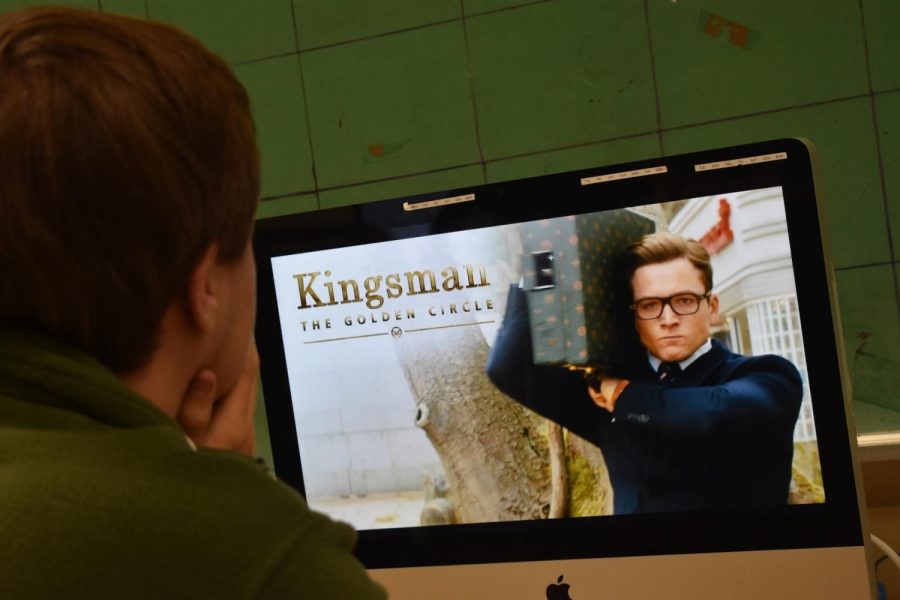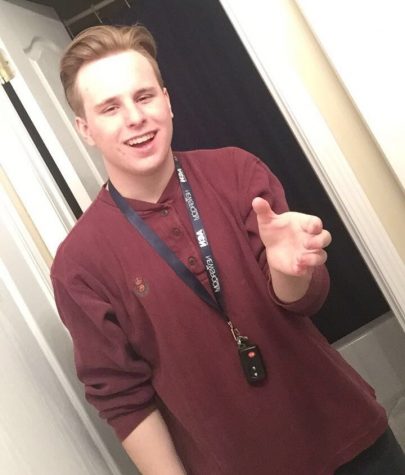Kingsman 2: The story comes full (golden) circle
The characters of Kingsman 2 all carry around playfully unique weapons. Eggsy brandished a green suitcase machine gun that he held over his shoulder. Whiskey used an electric whip, fitting of his cowboy persona.
October 18, 2017
English filmmaker Matthew Vaughn let his newest adventure loose, Kingsman: The Golden Circle, to silver screens on September 22nd. The Golden Circle successfully expands on the Kingsman universe, creatively propelling the characters’ lives and stories forward, and each frame seems a visual masterpiece. However, certain characters and their actions feel awkward and underdeveloped. The film delivers a fantastic watch, full of visual eye-candy, but the storyline feels somewhat bogged down by minor plot-points. The Golden Circle’s biggest strength lies in the gorgeous cinematography present in every frame. The Kingsman Universe seems full of color, which helps give life to the world throughout the story. Directors use color to give scenes a certain feeling, and bright, popping colors fill the screen. Vaughn fills his world with color, setting the Kingsman Universe apart from other franchises. The colors hint at a more fun-filled, happy world of spies; opposed to the duller, less colorful, and more serious movies.
The transitions from scene to scene creatively and naturally move the story forwards. The most creative transition shifts the scene from Eggsy, played by Taron Egerton, and his pals smoking, by zooming into their stash of weed, which seamlessly fades into a helicopter shot of a mountain range, revealing the main villain’s base. The transition screams creativity and helps the audience instantly associate the main villain, a drug kingpin, with drugs. The action scenes throughout the movie rival those from the original in both scale and sheer awesomeness. The action scene longshots look fantastic, which displays the amount of amazing talent in the production crew, as scenes of those nature take extreme preparation and practice.
Straight-forward at its core, The Golden Circle’s story follows the lovable Eggsy Unwin after he and his fellow spies at Kingsman fall under attack. Eggsy and Merlin, masterfully portrayed by Mark Strong, survive the attack, and it is up to them to find those responsible and enact their vengeance. Despite the simple plot-line, the movie lacks focus, instead broadening its lens and following multiple undeveloped subplots instead of building on the main story. Left with limited resources after the attack, Eggsy and Merlin turn to “Doomsday Protocol,” which leads them to the Statesman, an Americanized version of The Kingsman spy agency.
Statesman agents, Tequila and Whiskey, played by Channing Tatum and Pedro Pascal respectively, each embody the cowboy personas associated with American spies, in how they dress and their actions. Jeff Bridges plays Champ, the head of Statesman, and does nothing the whole movie except introduce himself and deliver a sliver of exposition on the Statesman, a tragic waste of the star power that Jeff Bridges brings with him. With the action packed nature of Kingsman, Vaughn missed out by not including Bridges in at least one of the action scenes.
Halle Berry plays Ginger, the Statesmen’s version of Merlin, a stereotypical techie that talks the agents through their missions. Berry plays the role believably, but her character feels hollow, with none of her own character development. Ginger’s irrelevant subplot plays out as follows; at one point she asks Merlin if he would ever wanted to try his luck as a field agent, then at the end she asks Champ if she can become an agent and he allows her to. With no real development and barely any actual actions for her character in the story, this subplot distracts from the film’s main plot, weakening the film as a whole.
The Statesman reveal that they managed to recover Harry Hart, played by Colin Firth, Eggsy’s former mentor whom he views like a father, presumed dead in the last movie. A flashback shows the statesmen recovering Harry, left for dead after massacring an entire church full of people under mind control. The Statesmen pick up his body outside the church and quickly return to their base, leaving fans to question why they did not investigate the church. It seems weird and immersion breaking for international spies to not investigate at all, something that seems implied with their job title. Harry lost all of his memories as an international spy after the events in the first movie. The subplot of Harry’s recovery feels awkwardly placed and drawn out. After regaining his memories, he still periodically goes blank and becomes confused, and this causes Eggsy and others to lose faith in him. Harry shoots Whiskey after suspecting him of a traitor, something just barely hinted at before through visual cues, although nothing too reliable for Harry to actually make that conclusion. Harry suffers no consequences though, because Statesman can bring people back to life with their own experimental technology, which breaks the realism of the movie.
Julianne Moore plays Poppy, a drug kingpin at the top, reminiscent of a stereotypical 1950’s housewife, and the movie’s main antagonist. Poppy’s character development paints her as an egotistical maniac in her first scene, which ends with her eating a hamburger with human meat. Elton John becomes a running gag throughout the movie after Poppy kidnaps him for her entertainment. After expanding her drug empire worldwide, to the point where all drugs come from her, Poppy reveals to the world that she infected her drugs with a virus, one that only she owns the cure to. She then gives world leaders an ultimatum: legalize all drugs or watch hundreds of thousands of their citizens die. The evil plot, while admittedly far fetched, manages to scream Kingsman aesthetically so it works for this story.
Eggsy’s romance with Princess Tilde holds strong as the best subplot in the movie. The characters each receive proper development through various scenes showing their relationship, so the audience cares what happens to them. The audience feels an unnerving tension at the climax of the movie, when Tilde becomes infected with the virus after smoking a joint. Egerton does a great job showing Eggsy’s stress as Tilde reveals her condition to him, and Eggsy swears to find the cure. But shortly after on his way to defeat Poppy, he seems too relaxed and he pours a drink with Harry and Merlin, which kills the tension built up in the previous scene.
Merlin sacrifices himself on a trip mine so that Eggsy and Harry can break into Poppy’s base. This falls flat though because of how overdrawn it feels and how much screen time Vaughn chose to give Harry’s impending death. The fight between Eggsy, Harry, and Poppy does not deliver. Chased by one of Poppy’s robo-hounds, Harry barely escapes death, instead saved by none other than Elton John. Elton’s inclusion, while somewhat distracting, felt perfect for the movie. Even though his role starts out as a gag, Elton slowly becomes a major character towards the second half of the movie. After defeating her two robo-hounds, Eggsy and Harry infect Poppy with a more intense version of her own virus, hoping that she will give them access to the cure. When all seems won, Whiskey, indeed a traitor, reveals to Eggsy and Harry a tragic backstory about his wife’s murder at the hands of a meth addict. This motivates him to try and prevent Eggsy and Harry from releasing the cure. Vaughn does not reveal whether or not Whiskey and Poppy worked together in cahoots, making Whiskey’s actions feel forced at the last minute. The final fight looks amazing and the camera follows every bit of the action in a visually comprehensible way, not how most action movies make quick cuts to confuse the audience on purpose. Whiskey’s death by meat grinder plays out perfectly, which helps finish the movie with an almost literal slam dunk.
Overall, Kingsman: The Golden Circle delivered a fantastic movie-going experience, and moviegoers that enjoy fast paced action and comedy should definitely check it out before it leaves the silver screen.
The Chant’s Grade: B-







